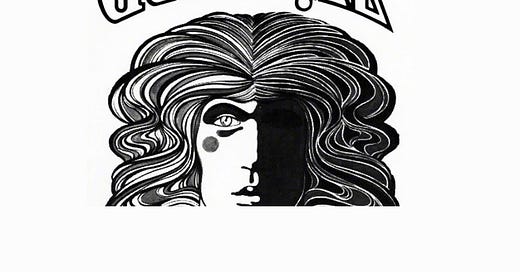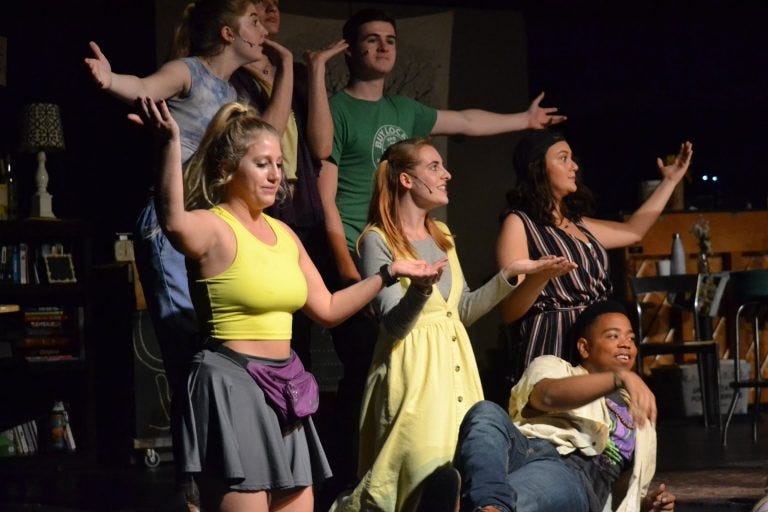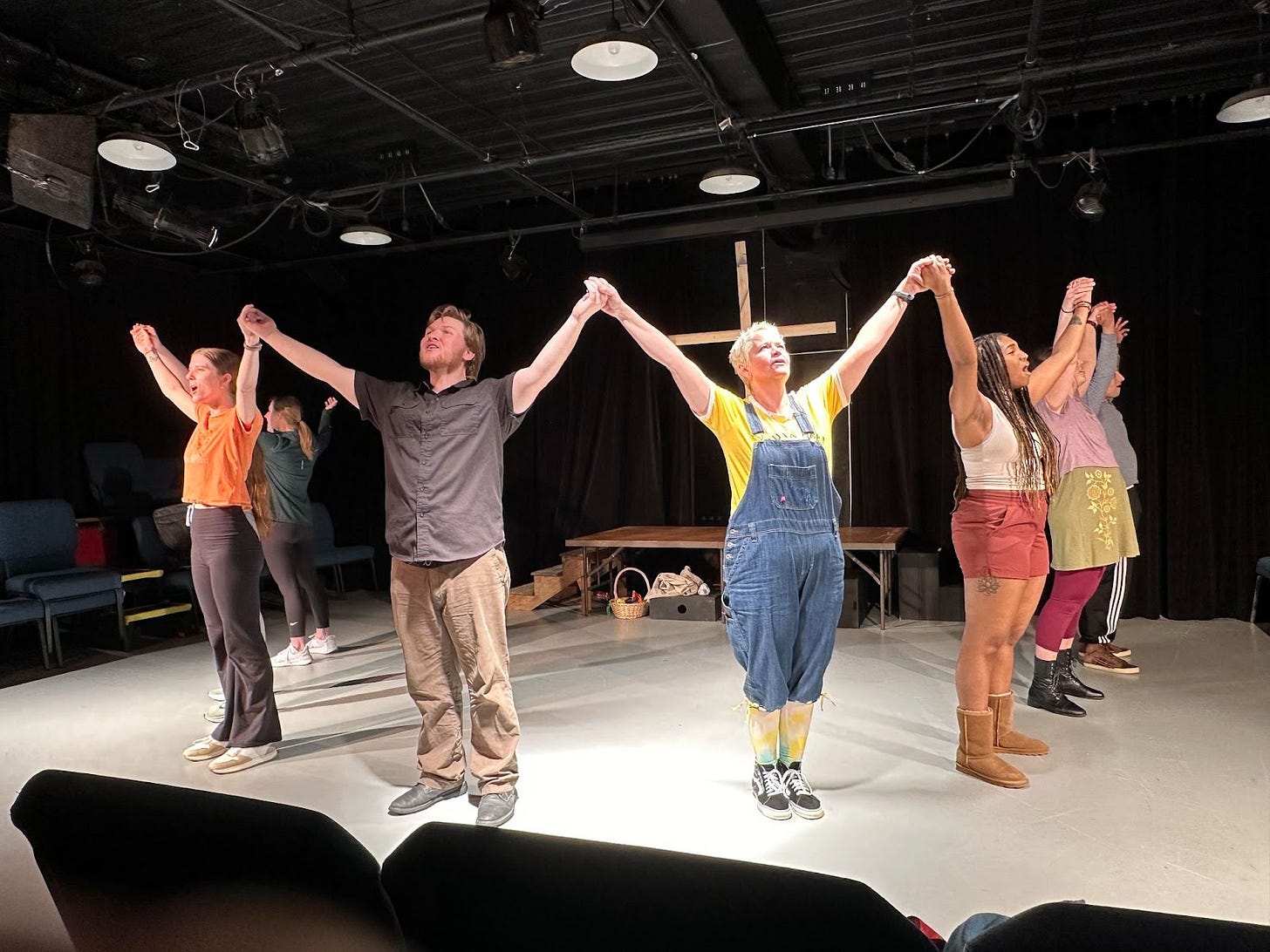After Betty Stookey graduated from Harvard Divinity School in 1997, she became chaplain at Northfield-Mount Hermon, a private secondary school in northwestern Massachusetts. In his new role as chaplain’s husband, Noel sang in many of Betty’s Sunday worship services in the NMH chapel, taught a songwriting class, and became artist-in-residence.
In 2000 Noel worked with artistic director David Rowland and music director Sheila Heffernon to introduce the rock musical Godspell to a new generation. Faced with size-of-stage limitations, Noel prevailed on the carpentry skills of David Hyman and the NMH shop to create a platform for the four-piece “balcony pit band” that would provide the musical backing some nine feet over the stage.
In terms of artistic and spiritual sensibility, Noel and Godspell were synergistic. Because this musical grants the production maximum freedom to play to the times, Noel encouraged the students to give vent to their “inner adolescent”—an attitude they understood instinctively. Identifying with the non-conforming followers of Jesus, the actors understood the doubts, mistrust, and concerns while at the same time couldn’t help but reveal the inherent joy and hope of youth. The energies were a perfect match and the show was a grand success.
Godspell was the brainchild of John-Michael Tebelak, a drama student at Carnegie Mellon. In 1970 he, in collaboration with fellow students, wrote a play originally named The Godspell for his master’s thesis. According to Carol de Giere’s The Godspell Experience (2014), “His plan was to re-approach the Biblical parables and texts with the innocence of a child, and to play with the material as if it was a school recess.” Instead of a formal script, the work consisted mainly of texts from the New Testament Gospel of Matthew. Tebelak chose hymn texts and members of the cast wrote the music for their performance at Carnegie Mellon. The show was so successful that it moved to New York where producers invited Stephen Schwartz, another Carnegie grad, to write a new score
Tebelak was inspired to write Godspell by two experiences. In March 1970 he attended an Easter Vigil service in a church in Pittsburgh and was struck by the lack of passion in the service. He found no joy in either the priest or the congregation. He said, “I left with the feeling that, rather than rolling the rock away from the Tomb, they were piling more on.”
Tebelak’s other inspiration was Harvey Cox’s 1969 Feast of Fools. A professor at Harvard Divinity School, Cox maintained that Western culture and organized religion had lost festivity and fantasy. He defined “festivity” as “the capacity for genuine revelry and joyous celebration” and fantasy as “the faculty for envisioning radically alternative life situations.” Both enlarge our capacity for creativity, and both are necessary if religion is to be accessible to people. The title of Cox’s book comes from the medieval feast of fools, a festival in which ordinary people critiqued public figures and institutions, including the church, with satire and parody. Writing just a few years after some theologians were talking about “the death of God,” Cox said contemporary people may have to meet God “first in the dance before they can define him in the doctrine.”
Toward the end of the cultural revolution of the 60s, Tebelak created Godspell as a "way in" to religious experience and the teachings of Jesus through the dance rather than the doctrine. He decided to use clowns to create an atmosphere of celebration and hope. The cast became clowns as they were drawn together by Jesus—an idea based not only on Cox's work, but also on the joy of the “flower children” of the 1960s and early 1970s. Scott Miller, who has directed many musicals, writes, “The cast as ordinary people becoming clowns illustrated a dramatic change, a very visible kind of conversion. This hybrid of clowns and flower children was a familiar image to audiences of the early 70s.”
Noel’s video rendering of his song “April Fool” draws on many of those same images as the lyrics unfold.
You, April Fool, why must You always play the clown?
You had the edge, You laid it down
You gave it up without a sound…
Oh April Fool, how can they say "love is cruel"?
They catch the ring but drop the jewel
Like a teardrop in a pool…
As Cox defined fantasy as “the faculty for envisioning radically alternative life situations,” so it seems the use of metaphor also increases the breadth of understanding by expanding our emotional language. Rejection of innocence becomes palpable, and Christ’s sacrifice becomes personally identifiable when next we encounter hate or rigidity of doctrinal belief.
April Fool, You wear Your heart on Your sleeve
And though they laugh when you leave
You call it Love and I believe…
One of the reasons Godspell has lasted 54 years is that the script makes room for contemporary issues and events. In August 2020 the Berkshire Theatre Group staged Godspell as the first professional musical in the U.S. since the beginning of the Covid lockdown. A message on the theater's website addressed the contemporary situation, saying,
We are in the midst of a Global Pandemic. We are also in the midst of another cultural revolution. We are social distancing and maintaining physical space for the safety of all, which in turn can lead to feelings of isolation. We are also facing uncomfortable truths about the inequalities that have always existed in our society. The world is changing and evolving day by day, hour by hour, and minute by minute. So too does each note and each word of Godspell evolve and take on new meaning with every performance.
As the Berkshire Theatre website message concluded and as Easter approaches, “... in an era of uncertainty and isolation, Godspell’s message of hope and unity has never been more relevant.”
Connections:
Read Scott Miller’s “Inside Godspell,” from his book From Assassins to West Side Story.
Visit the website of the Berkshire Theatre Group to read “History and Impact of Godspell.”
View Noel’s video “April Fool” here:
Read Cathleen Falsani’s meditation on the text and song “You Are the Light of the World” from Diana Butler Bass’s The Cottage.
The photos at the end of our post are representative of the hundreds of amateur theaters across the country that enrich their communities with musical like Godspell.
Vibrations:
Hear “You Are the Light of the World,” from the 1973 film adaptation of Godspell.
Watch the entire 2018 production of Godspell by the Carolina Company, Chapel Hill, NC.
Resonance
If you’ve seen different versions of Godspell from different times, how were they staged to fit the times?
Photos from Community Theatre Productions of Godspell
Photo courtesy of Company Carolina, a student performing arts group at UNC-Chapel Hill








I'd forgotten the beauty in April Fool. Thank you, Noel.
" we all are connected " as the comments are all personal how Godspell came into their lives......